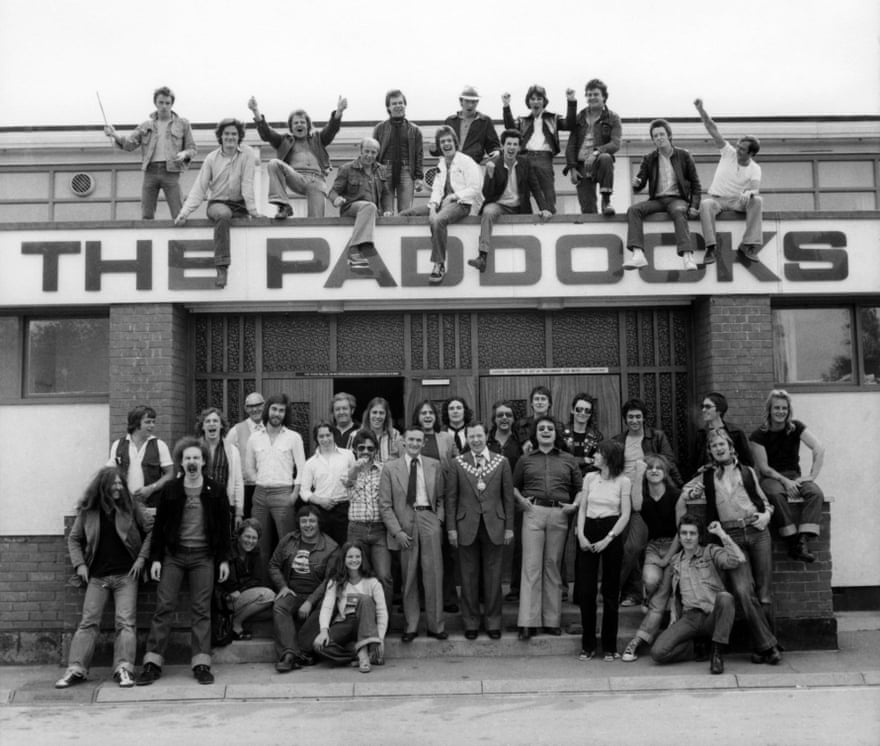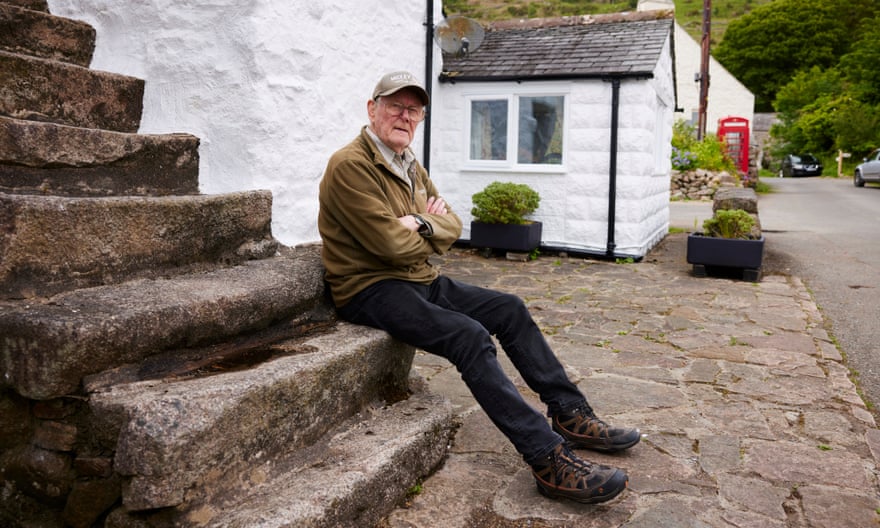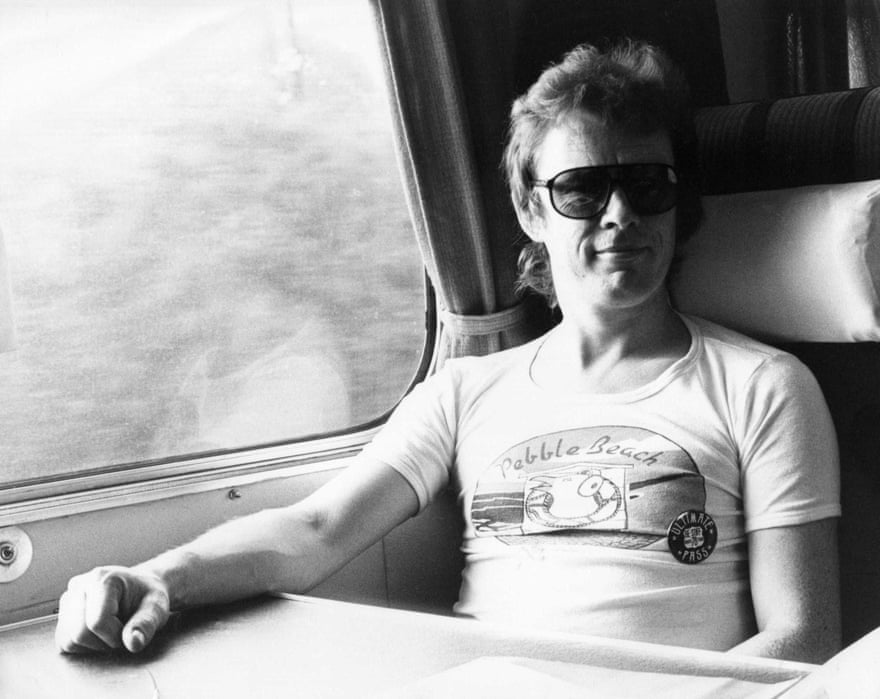If you want to get away from everything, you could do worse than head for Boot, in Eskdale, Cumbria. With a population of just 15, the tiny village is reached via the hazardous, winding Hardknott Pass, which shares the title of England’s steepest road. It is inaccessible in winter months and a challenging drive even in summer. “The Woolpack pub at the bottom does a good trade from people who come over,” chuckles Mickey Jupp, who has lived here for 39 years. “They come in and say: ‘Can I have a large brandy?’”
Before moving to Eskdale, “Juppy” was a quietly but profoundly influential figure in British pop music: a pioneer of 1970s pub rock, he was cited as an inspiration by Dr Feelgood, whose guitarist Wilko Johnson called him “the best white singer I’ve ever heard”, and his songs have been covered by artists ranging from Nick Lowe to Elkie Brooks. However, becoming disaffected with the industry, his career stopped abruptly after his brother gave him the opportunity to look after a cottage in the area they had loved visiting as children. “I knew it was a bad career move,” Jupp admits over a pint in the Boot Inn, where locals know him well. “’Cos you’re supposed to ‘stay close to London’, but look at the beautiful hills. After nearly 40 years I still think: wow, I live here.”
Jupp insists he was “running to something, not running away”, but, under the radar, he kept writing songs, squirrelling away home recordings and playing occasional gigs at the Woolpack to locals, tourists and travelling hardcore fans. Eventually, word reached Alan Bambrough of the Hastings-based label Conquest Music, who was astonished to discover that Jupp had amassed a vast secret archive – now estimated at 500 songs – of heartfelt, observant R&B.
“It was far too good to be restricted to a small corner of Eskdale and a group of faithful Scandinavian and German fans on Facebook,” Bambrough says. It took him several years to persuade Jupp to put them out – the forthcoming Up Snakes, Down Ladders will be his first new album in four decades – and only on condition that there will be little promotion, no touring and no appearances on Later … With Jools Holland. “The money was useful, but the most important thing was to find a good home for the songs,” says Jupp, 78. But he is adamant: “I don’t want my career being resurrected.”
Jupp initially emerged in the 1960s Southend-on-Sea scene that spawned the Paramounts – “who the Rolling Stones called the best R&B band in the country”, Jupp says – the band that morphed into Procul Harum. Jupp was in the Orioles when he was “gently pushed” into prison over unpaid maintenance payments to his first wife. “The longest six weeks of my life,” he shudders. “For years afterwards, I would dream that I was still inside. Then I’d wake up and think: am I awake or am I still dreaming?”
He charts his life in “turning points”, starting with his first management and recording contract. “The number of times I’ve thought: I should have said no,” he sighs. “For my own mental health. I was happier working in a builder’s merchants.” Instead, his band Legend recorded for Bell and then Vertigo; their eponymous 1971 album for Vertigo influenced Paul Weller. “But the record company weren’t promoting us and then Marc Bolan sort of stole our drummer [Bill Fifield AKA Bill Legend] for T Rex,” Jupp says. Soon afterwards, Legend imploded after an “awful” gig. “That was April 1972. If we’d have stuck together another six months, we’d have been right there on the first wave of pub rock. That’s the story of my life.”
Instead, he became a godfather to the back-to-basics scene spearheaded by the likes of Kursaal Flyers from Southend, Ducks Deluxe from London and Dr Feelgood from Canvey Island. Dr Feelgood covered Cheque Book and Down at the Doctors, a song Jupp wrote in 10 minutes.

“The Feelgoods were a bit too fast for me, but were the forerunner of punk,” he says. “I first saw ’em supporting Legend. A few years later, I was supporting them.” He was working in a music shop when the Feelgoods singer Lee Brilleaux – a big fan – insisted: “Juppy, you wanna get yourself a band together.” So, he formed the Mickey Jupp Big Band. “I put my heart and soul into it and we got storming reviews,” he says. “But egos kicked in, so I quit. I never had the same enthusiasm for anything afterwards.”
As a solo artist, Jupp appeared on bills with Ian Dury’s pre-Blockheads band Kilburn and the High Roads – “A drummer on crutches, fronted by a guy [Dury] who couldn’t sing a note, but absolutely fantastic” – and a pre-Clash Joe Strummer, who was in the 101-ers. “He said to me: ‘Great gig man!’ That’s what you’ve got to say to get anywhere. ‘Great gig, man!’”
When punk happened, Stiff Records released the Mickey Jupp’s Legend compilation, but when the Be Stiff tour (Jupp, Jona Lewie, Wreckless Eric, Lene Lovich and Rachel Sweet) toured the UK by train he was “32, 33, the oldest one aboard”. He opted out of the Stiff special at Bottom Line in New York, telling the label he preferred to go home for Christmas. “My name was on the poster, but crossed out,” he chuckles. Jupp also turned down joining Dave Edmunds’ hit band Rockpile, although Edmunds subsequently co-produced 1978’s acclaimed Juppanese, with Nick Lowe.
From 1979, Long Distance Romancer was very expensively produced by 10cc’s Godley and Creme (“£28,000 back then”), but Jupp felt they overpolished his songs. Status Quo’s Francis Rossi was behind the desk for 1983’s Shampoo, Haircut and Shave: “He spent most of his time sniffing stuff. The album had a funny sound to it.”

There were more rewarding interactions. When the Elvis Presley songwriters Jerry Leiber and Mike Stoller wanted to include a verse of their own in Elkie Brooks’s cover of Jupp’s He Could Have Been an Army, which they were producing, he felt like saying no. “But I thought: come on, Juppy, you can have a record with ‘Jupp, Leiber, Stoller’ on it!” Another “magic moment” came when Ricky Nelson covered Jupp’s You Know What I Mean, backed by Presley’s old band, the Jordanaires. “To me, as a kid, Ricky Nelson was second only to Elvis.” His personal life has been equally colourful. “Three wives, four kids. A lot of them out of wedlock.”
In 1978, NME described Jupp as “stubborn. He won’t compromise his principles, fly in a plane to a gig or join the Musicians’ Union. That means he can’t appear on Top of the Pops.” Jupp admits his career has been one of near misses, but he doesn’t regret how it has turned out. “It would have been easier if my frame of mind had been different,” he concedes, draining his pint. “I just didn’t have whatever you need to click with people in this business. I never actually wanted to be famous. All I’ve ever really wanted to do is write songs.”

